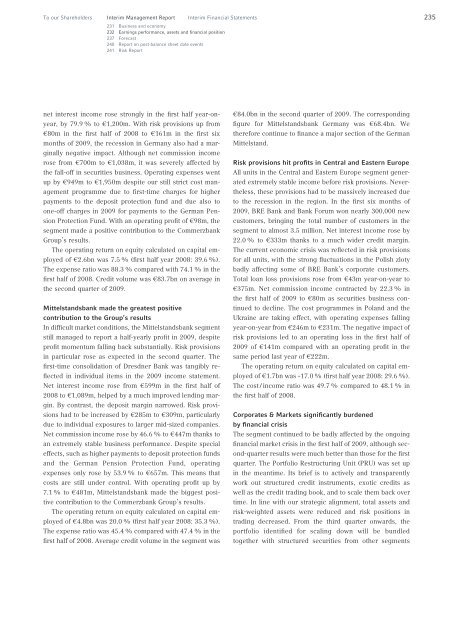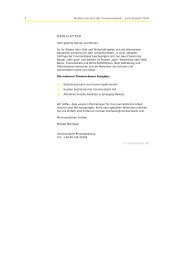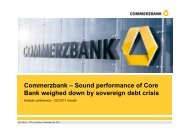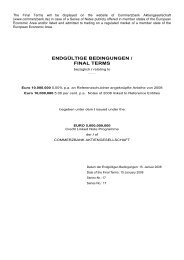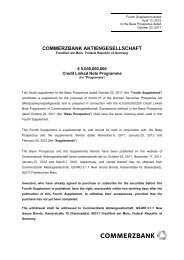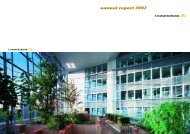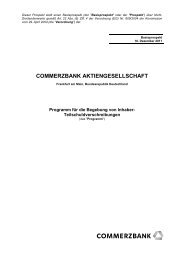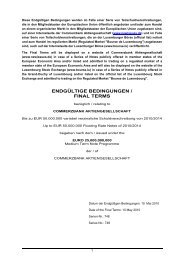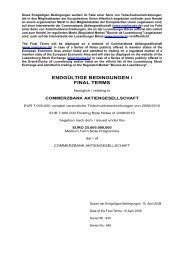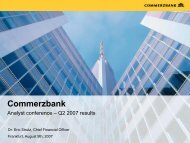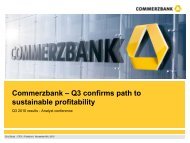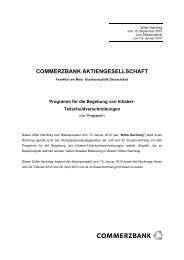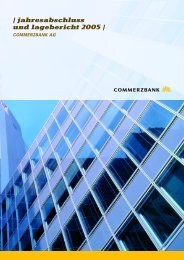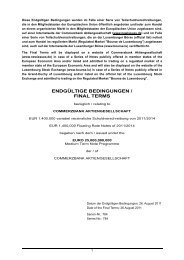COMMERZBANK AKTIENGESELLSCHAFT
COMMERZBANK AKTIENGESELLSCHAFT
COMMERZBANK AKTIENGESELLSCHAFT
You also want an ePaper? Increase the reach of your titles
YUMPU automatically turns print PDFs into web optimized ePapers that Google loves.
To our Shareholders Interim Management Report Interim Financial Statements<br />
231 Business and economy<br />
232 Earnings performance, assets and financial position<br />
237 Forecast<br />
240 Report on post-balance sheet date events<br />
241 Risk Report<br />
net interest income rose strongly in the first half year-on-<br />
year, by 79.9 % to €1,200m. With risk provisions up from<br />
€80m in the first half of 2008 to €161m in the first six<br />
months of 2009, the recession in Germany also had a mar-<br />
ginally negative impact. Although net commission income<br />
rose from €700m to €1,038m, it was severely affected by<br />
the fall-off in securities business. Operating expenses went<br />
up by €949m to €1,950m despite our still strict cost man-<br />
agement programme due to first-time charges for higher<br />
payments to the deposit protection fund and due also to<br />
one-off charges in 2009 for payments to the German Pension<br />
Protection Fund. With an operating profit of €98m, the<br />
segment made a positive contribution to the Commerzbank<br />
Group’s results.<br />
The operating return on equity calculated on capital employed<br />
of €2.6bn was 7.5 % (first half year 2008: 39.6 %).<br />
The expense ratio was 88.3 % compared with 74.1 % in the<br />
first half of 2008. Credit volume was €83.7bn on average in<br />
the second quarter of 2009.<br />
Mittelstandsbank made the greatest positive<br />
contribution to the Group’s results<br />
In difficult market conditions, the Mittelstandsbank segment<br />
still managed to report a half-yearly profit in 2009, despite<br />
profit momentum falling back substantially. Risk provisions<br />
in particular rose as expected in the second quarter. The<br />
first-time consolidation of Dresdner Bank was tangibly reflected<br />
in individual items in the 2009 income statement.<br />
Net interest income rose from €599m in the first half of<br />
2008 to €1,089m, helped by a much improved lending margin.<br />
By contrast, the deposit margin narrowed. Risk provisions<br />
had to be increased by €285m to €309m, particularly<br />
due to individual exposures to larger mid-sized companies.<br />
Net commission income rose by 46.6 % to €447m thanks to<br />
an extremely stable business performance. Despite special<br />
effects, such as higher payments to deposit protection funds<br />
and the German Pension Protection Fund, operating<br />
expenses only rose by 53.9 % to €657m. This means that<br />
costs are still under control. With operating profit up by<br />
7.1 % to €481m, Mittelstandsbank made the biggest positive<br />
contribution to the Commerzbank Group’s results.<br />
The operating return on equity calculated on capital employed<br />
of €4.8bn was 20.0 % (first half year 2008: 35.3 %).<br />
The expense ratio was 45.4 % compared with 47.4 % in the<br />
first half of 2008. Average credit volume in the segment was<br />
€84.0bn in the second quarter of 2009. The corresponding<br />
figure for Mittelstandsbank Germany was €68.4bn. We<br />
therefore continue to finance a major section of the German<br />
Mittelstand.<br />
Risk provisions hit profits in Central and Eastern Europe<br />
All units in the Central and Eastern Europe segment generated<br />
extremely stable income before risk provisions. Nevertheless,<br />
these provisions had to be massively increased due<br />
to the recession in the region. In the first six months of<br />
2009, BRE Bank and Bank Forum won nearly 300,000 new<br />
customers, bringing the total number of customers in the<br />
segment to almost 3.5 million. Net interest income rose by<br />
22.0 % to €333m thanks to a much wider credit margin.<br />
The current economic crisis was reflected in risk provisions<br />
for all units, with the strong fluctuations in the Polish zloty<br />
badly affecting some of BRE Bank’s corporate customers.<br />
Total loan loss provisions rose from €43m year-on-year to<br />
€375m. Net commission income contracted by 22.3 % in<br />
the first half of 2009 to €80m as securities business continued<br />
to decline. The cost programmes in Poland and the<br />
Ukraine are taking effect, with operating expenses falling<br />
year-on-year from €246m to €231m. The negative impact of<br />
risk provisions led to an operating loss in the first half of<br />
2009 of €141m compared with an operating profit in the<br />
same period last year of €222m.<br />
The operating return on equity calculated on capital employed<br />
of €1.7bn was –17.0 % (first half year 2008: 29.6 %).<br />
The cost / income ratio was 49.7 % compared to 48.1 % in<br />
the first half of 2008.<br />
Corporates & Markets significantly burdened<br />
by financial crisis<br />
The segment continued to be badly affected by the ongoing<br />
financial market crisis in the first half of 2009, although second-quarter<br />
results were much better than those for the first<br />
quarter. The Portfolio Restructuring Unit (PRU) was set up<br />
in the meantime. Its brief is to actively and transparently<br />
work out structured credit instruments, exotic credits as<br />
well as the credit trading book, and to scale them back over<br />
time. In line with our strategic alignment, total assets and<br />
risk-weighted assets were reduced and risk positions in<br />
trading decreased. From the third quarter onwards, the<br />
portfolio identified for scaling down will be bundled<br />
together with structured securities from other segments<br />
235


